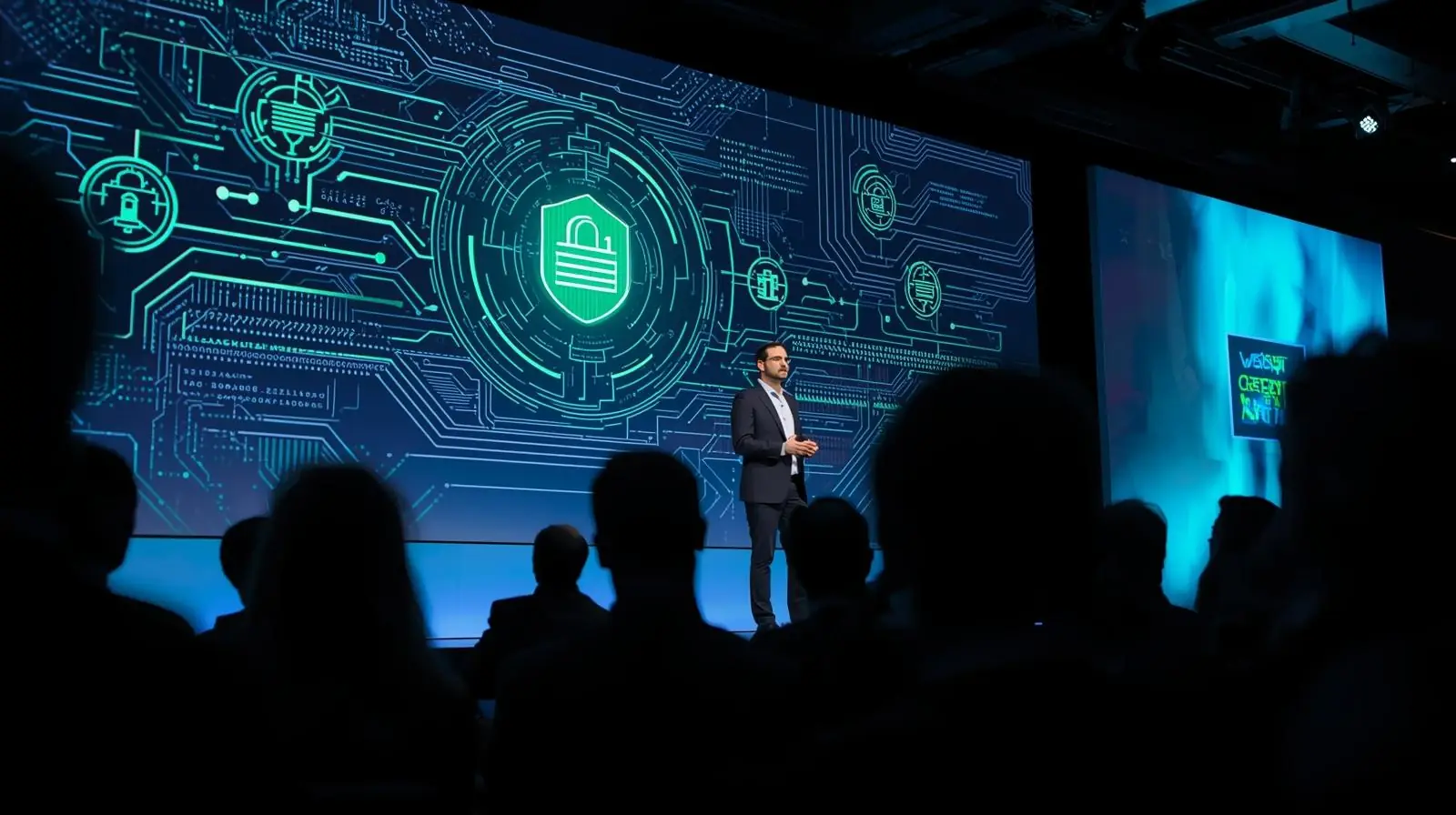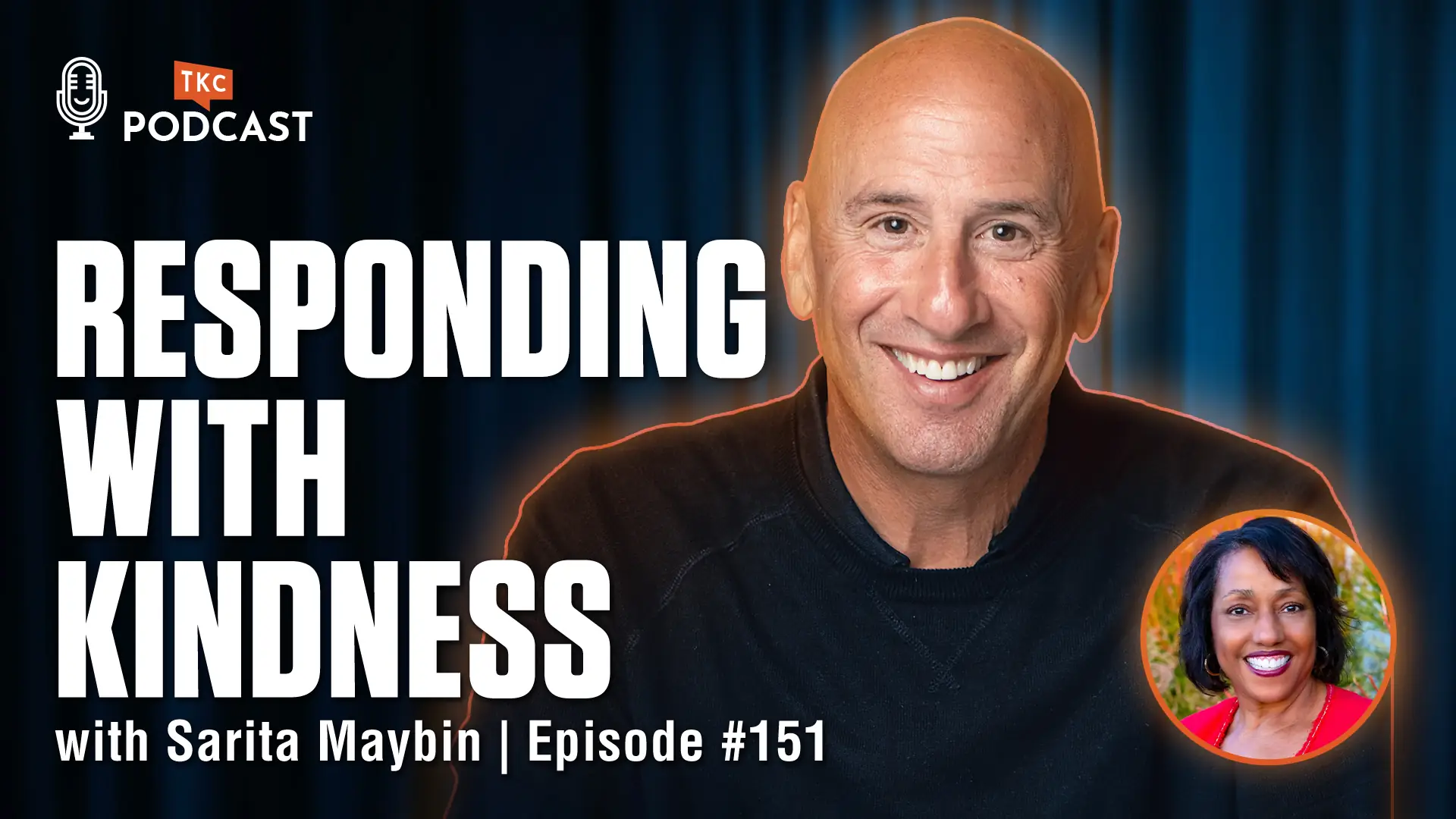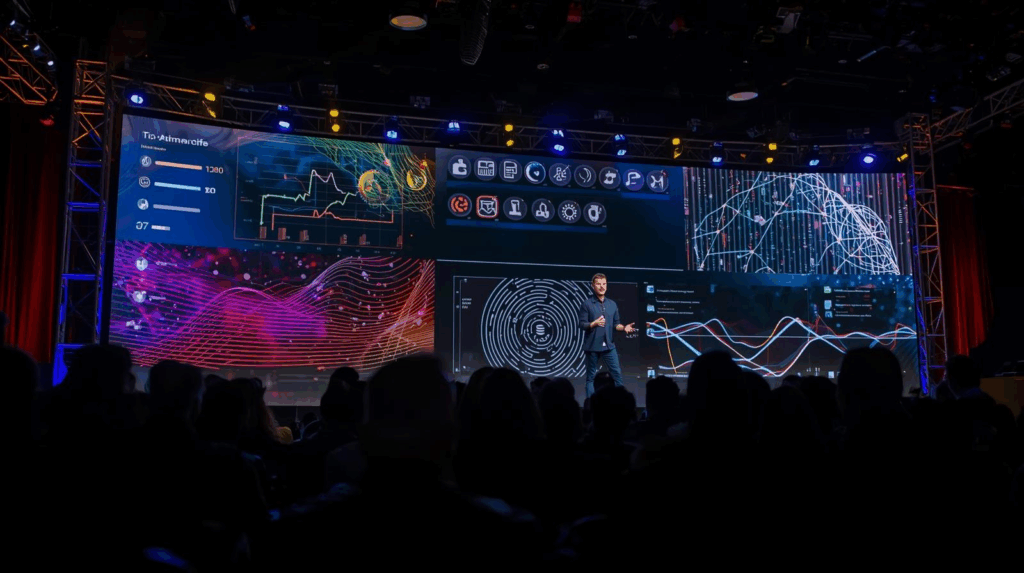
September 8, 2025Four Health Pillars That Transform Business Performance
Learn the four health pillars Olympic champion Apolo Ohno uses to maintain peak performance in business and life when perfection isn't possible.
What if the secret to better business decisions, stronger leadership presence, and sustained professional energy had nothing to do with strategy sessions or productivity hacks? What if it was as simple as how you sleep, eat, move, and think?
This revelation hit me during a conversation with health keynote speaker Apolo Ohno, the most decorated American Winter Olympian with eight medals to his name. Here’s something that might surprise you: despite his incredible athletic achievements, Apolo told me the hardest part wasn’t competing on the world’s biggest stage—it was figuring out how to maintain his health when his structured athletic career ended and he entered the unpredictable world of business.
Think about it. He went from having trainers, nutritionists, and a completely regimented routine to the same chaotic lifestyle most professionals face. Business trips with questionable hotel food. Back-to-back meetings that derail workout plans. Conference calls that stretch past dinner time. The kind of schedule that makes “self-care” feel like a luxury you simply can’t afford.
But here’s what this Olympic champion discovered through trial and error: you don’t need everything to be perfect to maintain optimal health in a demanding professional environment. What you need is a system that works when life gets messy, deadlines loom, and travel disrupts every healthy habit you’ve tried to establish.
During our in-depth conversation, Apolo shared his four-pillar approach to health that keeps him mentally sharp whether he’s delivering a keynote presentation in Tokyo, navigating a business crisis, or making critical decisions under pressure. This isn’t about transforming into an Olympic athlete overnight—it’s about not feeling physically and mentally drained when you need to perform at your highest level professionally.
The Foundation That Changes Everything About Professional Performance
“So the four pillars of health, like how you sleep, how you eat, how you move, and how you think. So your social environment, psychologically, is who you see in the mirror. But those four pillars are like the table, legs to a table,” explains Apolo, drawing from years of experience transitioning from elite athletics to successful entrepreneurship.
These four pillars—sleep, nutrition, movement, and mindset—form the infrastructure that supports every professional decision you make, every presentation you deliver, and every leadership moment that defines your career trajectory. When even one pillar weakens, the entire structure becomes unstable, affecting your ability to think clearly, communicate effectively, and maintain the presence that commands respect in business settings.
The elite performance mindset that Apolo developed during his Olympic career translates directly to the corporate world. Just as he couldn’t afford to have an off day during competition, business leaders can’t afford to operate at diminished capacity during crucial meetings, negotiations, or strategic planning sessions.
What makes Apolo’s approach particularly valuable for busy professionals is its emphasis on progress over perfection. He understands that the controlled environment of Olympic training doesn’t exist in the business world, where travel, stress, and competing priorities constantly challenge your ability to maintain consistent health habits.
Sleep Strategy When Hotel Beds and Time Zones Work Against You
The first pillar—sleep—becomes exponentially more challenging when your professional responsibilities involve irregular schedules, different time zones, and accommodations that weren’t designed with optimal rest in mind. Apolo’s approach focuses on what you can control rather than lamenting what you can’t.
When facing a terrible hotel bed, noisy neighbors, or jet lag that has your internal clock completely confused, the goal shifts from achieving perfect sleep to maximizing recovery within existing constraints. This means prioritizing sleep duration when sleep quality is compromised, creating consistent pre-sleep routines that signal your body regardless of location, and understanding that one poor night’s sleep won’t derail your performance if you maintain overall consistency.
The business leadership implications are significant. Leaders operating on insufficient sleep make poorer decisions, exhibit less emotional regulation, and struggle to maintain the mental clarity required for complex problem-solving. Apolo learned that protecting sleep isn’t selfish—it’s strategic. Your ability to lead effectively depends on your cognitive capacity, which depends directly on adequate rest.
For professionals who travel frequently, Apolo recommends treating sleep preparation with the same seriousness you’d apply to preparing for an important presentation. This includes packing sleep aids like eye masks and earplugs, establishing consistent bedtime routines regardless of location, and avoiding the temptation to use travel as an excuse for completely abandoning healthy sleep patterns.
Nutritional Choices That Support Mental Clarity Under Pressure
Airport food courts, hotel breakfast buffets, and catered business lunches weren’t designed to optimize your cognitive performance or sustain your energy throughout demanding workdays. Yet these often become the primary food sources for traveling professionals, leading to energy crashes, poor concentration, and the kind of afternoon sluggishness that makes important meetings feel like endurance tests.
Apolo’s nutritional approach for busy professionals focuses on making the best available choice rather than pursuing nutritional perfection. When you’re stuck in an airport with limited options, you’re not choosing between a perfectly balanced meal and junk food—you’re choosing between better and worse versions of limited options. This mindset shift removes the all-or-nothing thinking that leads many professionals to completely abandon healthy eating when travel or work demands disrupt their normal routines.
The key lies in understanding how different foods affect your energy levels, mental clarity, and overall performance throughout the day. Just as Olympic athletes learn to fuel their bodies for optimal performance, business professionals can learn to make food choices that support sustained energy and mental acuity during long work days.
This becomes particularly crucial during high-stakes professional situations. The food you eat before an important presentation, during a day of critical negotiations, or while managing a business crisis directly impacts your cognitive function, stress resilience, and ability to think clearly under pressure. Apolo emphasizes that nutrition isn’t about following rigid dietary rules—it’s about understanding how fuel affects performance and making informed choices that support your professional objectives.
Movement That Fits Into Impossible Schedules
The third pillar—movement—presents unique challenges for professionals whose days are structured around meetings, travel, and desk work. The traditional gym membership approach often fails because it assumes consistent schedules and predictable locations, neither of which exist in most demanding professional environments.
Apolo’s movement philosophy centers on finding opportunities within existing constraints rather than waiting for perfect conditions that may never materialize. This means taking stairs instead of elevators, walking during phone calls when possible, and incorporating brief movement breaks that can be done in hotel rooms or office spaces.
The communication benefits of regular movement extend beyond physical health. Apolo notes that leaders who maintain physical activity demonstrate higher energy levels during presentations, exhibit more confident body language, and project the kind of vitality that inspires confidence in their teams and stakeholders.
For professionals who spend most of their time in sedentary environments, even small amounts of movement can significantly impact mental clarity and stress management. The goal isn’t to replicate an Olympic training regimen—it’s to counteract the physical and mental effects of prolonged sitting, irregular schedules, and high-stress environments that characterize many professional roles.
Research supports what Apolo learned through experience: regular movement, even in small amounts, improves cognitive function, enhances mood regulation, and increases resilience to stress. For business leaders, this translates to better decision-making capacity, improved emotional stability during challenging situations, and the physical presence that commands attention in professional settings.
Mindset Management When Everything Feels Out of Control
The fourth pillar—how you think—might be the most crucial for professional success, yet it’s often the most neglected. Apolo’s transition from athletics to business taught him that managing your mental environment is just as important as managing your physical environment, particularly when external circumstances become unpredictable or stressful.
“Your health and your mindset are really intrinsically tied to not only the quality but also the fulfill the fulfillment aspect of your life. And so my mission is to remind folks that this is tied to this and this is tied to everything else,” Apolo explains, highlighting the interconnected nature of physical and mental well-being in professional contexts.
This pillar involves developing the mental resilience to maintain perspective during setbacks, the focus to prioritize effectively when everything seems urgent, and the emotional regulation to lead effectively under pressure. Just as Olympic athletes learn to perform despite external pressures and unexpected circumstances, business leaders must develop the mental skills to maintain clarity and composure when market conditions shift, teams face challenges, or personal circumstances create additional stress.
The thought leadership that emerges from this approach isn’t based on having all the answers—it’s based on maintaining the mental capacity to think clearly, adapt quickly, and make sound decisions even when information is incomplete or circumstances are challenging.
For many professionals, the mindset pillar requires the most intentional development because it’s often the least visible. Unlike sleep, nutrition, and movement, which have obvious external markers, mental health and cognitive performance can deteriorate gradually without immediate recognition until performance problems become apparent in professional settings.
The Performance Gap Between Knowing and Doing
Understanding these four pillars intellectually differs significantly from implementing them consistently in real-world professional environments. Apolo identifies this as the performance gap that separates those who maintain high-level performance over time from those who experience burnout, decreased effectiveness, or health problems that eventually impact their professional capabilities.
The transition from knowing to doing requires systems that account for imperfect conditions, competing priorities, and the reality that professional demands often seem to conflict with health maintenance. This is where Apolo’s Olympic training background provides valuable insights: elite athletes don’t achieve consistency through perfect conditions—they achieve it through adaptable systems that work regardless of external circumstances.
For business professionals, this means developing health habits that are resilient enough to survive travel schedules, flexible enough to adapt to changing priorities, and simple enough to maintain during high-stress periods. The goal isn’t to replicate ideal conditions consistently—it’s to maintain baseline health standards that support optimal cognitive and physical performance even when conditions are far from ideal.
This approach requires a fundamental shift in perspective from viewing health as separate from professional success to understanding health as the foundation that makes sustained high performance possible. Just as entrepreneurs invest in systems and infrastructure to support business growth, successful professionals must invest in the health infrastructure that supports career longevity and peak performance.
Reading Your Energy Like a Business Metric
Apolo emphasizes that your physical and mental state directly affects how others perceive you in meetings, presentations, and negotiations. This isn’t about vanity or personal comfort—it’s about professional effectiveness and leadership presence. Feeling sharp, energetic, and mentally clear isn’t a luxury; it’s a strategic advantage that impacts every professional interaction.
Consider the difference between entering a high-stakes meeting feeling energetic, focused, and physically comfortable versus entering the same meeting feeling tired, sluggish, and physically uncomfortable. Your energy level affects your voice projection, your ability to think quickly, your patience during lengthy discussions, and your overall presence in the room.
The inspirational and motivational impact extends beyond personal performance to team leadership. Leaders who consistently demonstrate high energy levels and mental clarity inspire confidence in their teams, attract more opportunities, and create positive momentum that benefits entire organizations.
This requires treating your energy levels with the same attention you’d give to important business metrics. Just as you track financial performance, market indicators, and operational efficiency, monitoring your energy patterns helps identify what supports peak performance and what undermines it. This data-driven approach to health enables more informed decisions about scheduling, travel, nutrition, and stress management.
Small Changes That Compound Into Significant Results
Rather than pursuing dramatic lifestyle overhauls that rarely survive first contact with professional realities, Apolo advocates for incremental changes that compound over time. This approach recognizes that sustainable health improvements must integrate seamlessly with existing professional responsibilities rather than competing with them.
Skip the January gym membership fantasy that assumes you’ll suddenly have abundant time and motivation. Instead, focus on small modifications that require minimal additional time or resources: taking stairs instead of elevators, drinking more water throughout the day, establishing consistent bedtime routines regardless of location, and getting off electronic devices thirty minutes before sleep.
These seemingly minor adjustments create cumulative effects that significantly impact energy levels, mental clarity, and stress resilience over time. The key lies in consistency rather than intensity—maintaining small improvements daily rather than pursuing perfect habits occasionally.
The best-selling author and Olympic champion’s approach demonstrates that sustainable change happens through evolution rather than revolution. By focusing on modifications that fit within existing schedules and responsibilities, you’re more likely to maintain improvements long enough for them to become automatic habits that support long-term professional success.
The Strategic Advantage of Sustainable Health
Your health isn’t separate from your professional success—it’s the foundation everything else builds upon. When your energy is optimized, your decision-making improves, your patience increases during challenging situations, and your presence in professional settings becomes more commanding and confident.
This integration of health and professional performance represents a strategic approach that extends career longevity while improving current effectiveness. Leaders who understand this connection consistently outperform those who view health as separate from professional development because they’re operating from a stronger foundation that supports sustained high performance.
The four-pillar approach provides a framework for maintaining this foundation regardless of professional demands, travel schedules, or unexpected challenges that characterize most demanding careers. By focusing on progress rather than perfection, you can maintain health standards that support optimal performance even when conditions are far from ideal.
Understanding how to implement sales strategies, develop effective storytelling abilities, or support women leaders in your organization becomes more effective when you’re operating from a position of physical and mental strength rather than managing these responsibilities while running on caffeine and willpower.
The Foundation for Everything That Follows
Apolo Ohno’s transition from Olympic champion to successful entrepreneur and business leader provides a unique perspective on maintaining peak performance outside the controlled environment of professional athletics. His four-pillar approach—sleep, nutrition, movement, and mindset—offers a practical framework for busy professionals who want to maintain high performance standards without perfect conditions.
The beauty of this system lies in its adaptability. Whether you’re managing a crisis at three in the morning, delivering a presentation in another time zone, or navigating the kind of schedule that makes work-life balance feel like a theoretical concept, these pillars provide stable reference points for maintaining the physical and mental capacity required for professional excellence.
You don’t need to become an Olympic athlete to benefit from these insights, but you also can’t continue indefinitely operating on insufficient sleep, poor nutrition, minimal movement, and unmanaged stress. The professionals who thrive over the long term understand that health isn’t a separate consideration from success—it’s the infrastructure that makes sustained success possible.
When you implement these four pillars consistently, even imperfectly, you’re not just improving your health—you’re investing in the foundation that supports every aspect of your professional effectiveness. Your ability to lead, innovate, communicate, and perform under pressure all depend on the strength of this foundation.
Transform Your Performance Starting Today
Ready to implement the four health pillars that have helped Olympic champion Apolo Ohno maintain peak performance in both athletics and business? Your professional success depends on the foundation you build today.
Schedule a consultation to discuss peak performance strategies for your team
Book Olympic medalist Apolo Ohno for your next corporate event
Watch the complete interview with Apolo Ohno
Contact us with questions about transforming your organization’s performance
Discover More Insights
Get in TouchContact US
Fill out the form so we can best understand your needs.
A representative from The Keynote Curators will reach out to you.








